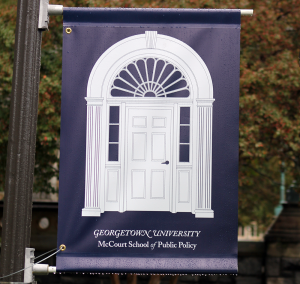
Administrators counteracted assertions that the McCourt School of Public Policy, opened in 2013, was overwhelmingly liberal.
While questions of racial and socioeconomic diversity draw increased attention to universities around the country, ideological diversity has also undergone scrutiny. Although students have asserted a perceived liberal tilt at the McCourt School of Public Policy, administrators contested the claims.
In a survey of more than 150,000 college freshmen conducted by the University of California in Los Angeles in fall 2014, though most students self-identify as politically middle-of-the-road, students increasingly hold liberal positions, showing stronger support for permitting gay marriage and addressing global climate change than the general populace.
The McCourt School of Public Policy directly confronts policy issues and thus often encounters a sharp divide along ideological lines. The nonpartisan school explains that in its teaching, “ideas are not accepted simply because they fit a particular ideological agenda.”
While McCourt School Associate Dean of Academic Affairs Mark Rom acknowledged a liberal tilt among the graduate students that he diagnosed based off anonymous clicker polling technology he uses in his courses, he did not find the tilt particularly pronounced or surprising.
“I would say that on balance the students are more liberal than conservative,” Rom said. “This is not surprising: I think this is probably the case at most public policy programs in the United States.”
Rom added that increasing diversity in all aspects in the student body is a priority, but noted that the applicant pool itself likely contained the ideological leaning.
”You know I would be thrilled if more conservative students applied to come to the McCourt School,” said Rom. “But I would also be delighted if students from more different countries around the world, more educational backgrounds, more economic classes applied. In my ideal world, our panel of applicants would be as diverse as possible in every way that we would care about. But ultimately, we make our judgments based on who has applied.”
A letter to the editor published in The Hoya on Feb. 24 by John Caddock (GRD ’16) claimed a lack of ideological diversity in the school, asserting that there are only two or three conservative students among the 120 members of the Class of 2016. However, he did not clarify how he exactly arrived at those numbers and Rom responded, saying that the liberal tilt was not as imbalanced as Caddock claimed.
Still, Caddock urged the university to reach out to more conservative students.
“I think this hurts the liberal students first and foremost,” Caddock said. “They throw opinions out there, but because there’s no one to challenge them, no one to push back on them, you just kind of have this almost like groupthink situation.”
Caddock added that the McCourt student population is not representative of the conservative-led government in which many of its students will be working after graduation.
A 2007 study by sociologists Neil Gross and Solon Simmons found that 62.2 percent of university professors throughout the country identified as liberal, while only 19.7 percent identified as conservative.
During the 2004 election cycle, Georgetown University faculty donated over $75,000 to Democratic presidential candidate John Kerry, in comparison to $3,000 for Republican candidate George W. Bush. In 2008, Georgetown University ranked seventh among universities in donations to the campaign of Democratic candidate Barack Obama. The rankings were similar to other prominent East Coast universities, including Harvard University and Princeton University. Georgetown University Associate Vice President for Federal Relations Scott Fleming (SFS ’72) said in 2004 that the university did not consider ideology in its workforce decisions.
“Hiring decisions, as well as rank and tenure decisions, here at Georgetown are most certainly not made on a political basis,” Fleming said (The Hoya, “Faculty Funds Favor Kerry,” Sep. 21, 2004). “Faculty are hired for their academic expertise.”
Despite the traditional liberal leanings in the university atmosphere, Caddock thinks that the McCourt School should recruit at more conservative institutions in order to correct the self-selection problem. The majority of McCourt’s recruitment is done at recruitment and admissions fairs.
“When you only have one student or zero students who disagree with what the professor is saying, there’s very little pushback if any,” Caddock said. “But if there are five dissenters or 10, then you have to change the way the class is run.”
Despite his skepticism of Caddock’s numbers, Rom invited Caddock to chat after reading the letter, explaining that he would be open to taking a look at the recruiting process at more conservative schools, as Caddock suggested.
“If we had more money to spend on recruiting, I think that would be something well worth looking into,” Rom said.
Amir Jilani (GRD ’16) disagreed with the characterization offered by Caddock, noting divergence among the views held by students, which prompts serious policy debates.
“This binary classification — liberal versus conservative — doesn’t entirely capture people’s sentiments, views and opinions, nor does it do justice to the diversity that exists within the student body,” Jilani wrote in an email. “In fact, rarely have I come out of a classroom here at the McCourt School thinking everyone was on the same page in terms of how to address an issue.”
Rom added that the school remains committed to developing a diverse student body.
“Our aspiration is that every student would feel welcomed here no matter where they’re from, what their sexual orientation is, what their political views are, what their aspirations are in terms of their career,” Rom said.




















